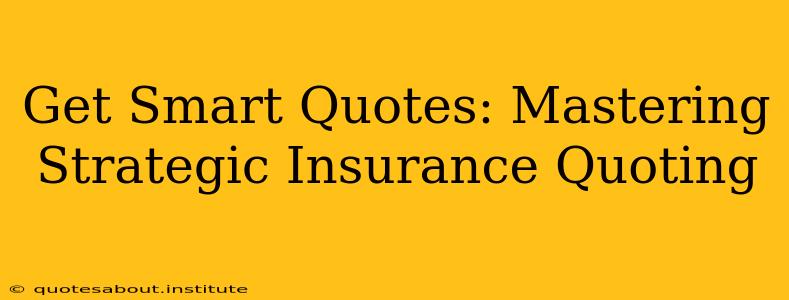Insurance quoting isn't just about crunching numbers; it's a strategic process that directly impacts your sales success. Mastering this skill means understanding your clients' needs, leveraging technology, and presenting quotes in a way that resonates and closes deals. This comprehensive guide will equip you with the knowledge and techniques to become a quoting virtuoso.
What is Strategic Insurance Quoting?
Strategic insurance quoting goes beyond simply generating a price. It's about understanding your client's unique circumstances, identifying their specific risks, and crafting a proposal that addresses those risks effectively and efficiently. It involves a deep understanding of your product offerings and the ability to tailor your approach to individual client needs. This proactive approach increases the likelihood of securing the sale and fostering long-term client relationships.
How to Get the Best Insurance Quotes for Your Clients?
Securing the best quotes for your clients hinges on several key factors:
-
Thorough Needs Analysis: Before even thinking about generating quotes, conduct a thorough needs analysis. Ask detailed questions to understand your client's assets, liabilities, and risk tolerance. This foundational step is crucial for recommending the most appropriate coverage.
-
Leveraging Technology: Utilize quoting software and CRM systems to streamline the process. These tools automate many tasks, reducing manual errors and saving valuable time. They often provide comparative analysis, enabling you to quickly present the most competitive options.
-
Accurate Data Entry: Garbage in, garbage out. Ensure that all the information entered into your quoting system is accurate and complete. Inaccuracies can lead to miscalculations and ultimately, lost sales.
-
Multiple Carrier Options: Don't limit yourself to a single insurance carrier. Offering quotes from multiple providers allows you to present a wider range of options and find the best fit for your client's needs and budget.
What are the Different Types of Insurance Quotes?
There are several types of insurance quotes, each with its own characteristics:
-
Instant Quotes: These are typically generated online and provide immediate pricing estimates. They often lack the detail of more comprehensive quotes.
-
Formal Quotes: These are detailed, written proposals that outline coverage specifics, premiums, and policy terms. They're typically generated after a thorough needs analysis.
-
Binding Quotes: These quotes guarantee the price and terms outlined, subject to underwriting approval. They offer certainty to both the client and the insurer.
-
Non-Binding Quotes: These quotes are estimates that may change after a more detailed review of the client's application and underwriting process.
What are some common mistakes to avoid when quoting insurance?
Avoiding common pitfalls is crucial for success:
-
Insufficient Information: Failing to gather enough information about your client's needs leads to inaccurate and potentially unsuitable quotes.
-
Lack of Personalization: Generic quotes fail to resonate with clients. Personalization shows you understand their specific situation.
-
Poor Presentation: A poorly presented quote, lacking clarity and professionalism, can easily be overlooked.
-
Ignoring Client Questions: Failure to address client questions and concerns can erode trust and hinder the closing process.
How can I improve my insurance quoting skills?
Continuous improvement is key:
-
Ongoing Training: Participate in industry events and workshops to stay updated on best practices and new technologies.
-
Mentorship: Seek guidance from experienced professionals in the insurance industry.
-
Regular Review: Regularly review your quoting processes to identify areas for improvement. Analyze closed and lost deals to understand what works best.
-
Client Feedback: Actively solicit feedback from your clients to understand their perspectives and refine your approach.
How long does it take to get an insurance quote?
The time it takes to get an insurance quote varies depending on the type of insurance, the complexity of the application, and the insurer's processing time. Instant quotes can be generated almost immediately, while formal quotes might take several days or even weeks for more complex policies.
What information is needed to get an insurance quote?
The specific information needed varies depending on the type of insurance, but generally includes details such as age, location, driving history (for auto insurance), property details (for home insurance), and health information (for health insurance).
By implementing these strategies and continuously refining your approach, you can transform your insurance quoting from a simple transaction into a strategic process that drives sales and strengthens client relationships. Mastering strategic insurance quoting is an investment in your long-term success.

